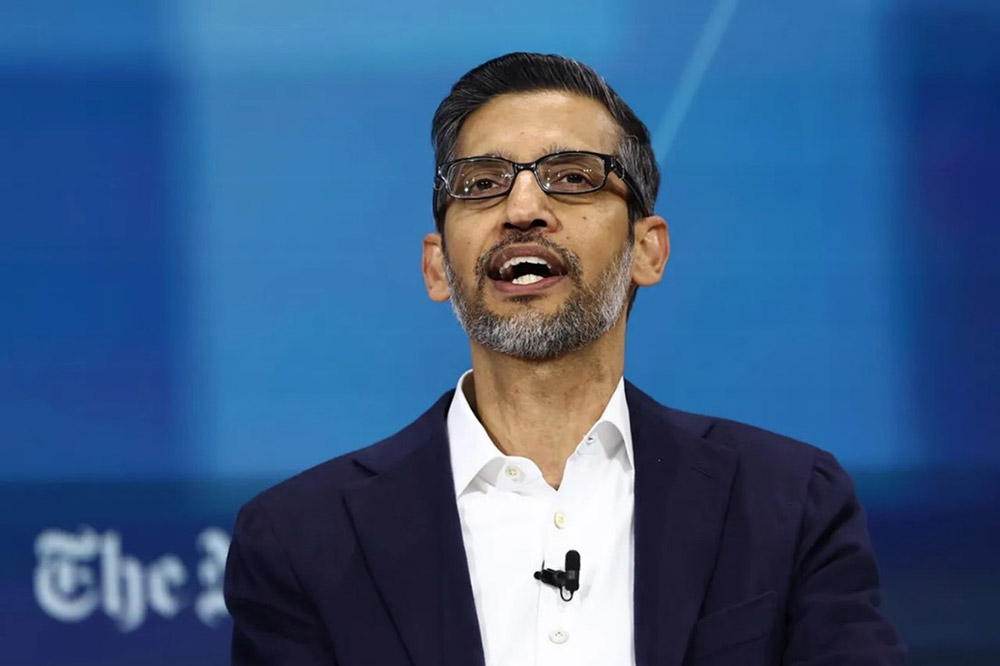
如果说美国经济正在走向衰退,谷歌(Google)尚未感受到寒意。
或者说,至少在3月31日之前是如此。
上周四,这家互联网搜索巨头公布了强劲的第一季度业绩,推动其股价在盘后交易中一度大涨5%,其核心广告和云业务均实现稳健增长。但这些业绩反映的是今年前三个自然月的表现,当时特朗普挑起的全球贸易战尚未真正打响。
至于当前面临的经营环境,谷歌三缄其口。尽管分析师努力了解最新动态,但谷歌母公司Alphabet的高管们在上周四的财报电话会议上对第二季度的经营情况守口如瓶。
首席商务官菲利普·辛德勒在回应相关询问时表示:“现在评论还为时过早。”
他补充道:“我们显然无法免受宏观环境的影响,但我们不想对潜在影响妄加揣测。”[辛德勒唯一愿意透露的信息是,希音(Shein)和Temu等中国零售商依赖的所谓“小额包裹关税豁免”政策被取消,这将给谷歌2025年的广告业务带来“轻微阻力”,尤其是来自亚洲零售商的业务。]
在经历了数周市场动荡,以及多重针对谷歌的担忧后,该公司亮眼的第一季度财报,加上其宣布将每股股息提高1美分并追加700亿美元股票回购计划,这些消息足以让投资者在上周四欢欣鼓舞。
谷歌第一季度营收同比增长12%,达到902亿美元,超出分析师平均预期的892亿美元;每股收益达2.81美元,远超华尔街预期的2.81美元。公司将业绩增长归功于金融、保险、医疗和零售行业广告客户的强劲需求。
视频网站YouTube的广告收入同比增长10%,达到89亿美元,谷歌云业务增长28%,营收达到123亿美元。
Alphabet首席执行官桑达尔·皮查伊重点介绍了公司在人工智能领域的进展,包括正在谷歌搜索服务中推广的“人工智能概览”功能。他表示每月有15亿用户使用该功能。公司重申了此前宣布的计划,即今年将斥资750亿美元用于云和AI基础设施的资本支出,这表明该公司依旧看好AI业务的前景。
谷歌面临多重风险
Alphabet正面临棘手的时期。在上周四财报发布前,公司股价年内已累计下跌约15%,跌幅超过纳斯达克指数和标普500指数。
Alphabet的业务面临多重风险:特朗普关税政策引发的经济不确定性冲击其核心广告业务,强大的新AI模型的激增威胁其搜索业务的霸主地位,政府监管机构则试图拆分这家公司。
但在上周四的财报电话会议上,高管们对Alphabet面临的法律诉讼和监管威胁只字未提,转而强调从快速增长的YouTube订阅业务到Waymo自动驾驶汽车等各项产品的进展。
由于Alphabet历来不在财报电话会议上提供详细业绩指引,这为其回避广告客户当前的(而非第一季度的)需求状况这个关键问题提供了掩护。
鉴于广告收入约占Alphabet总营收的四分之三,未来数月全球广告市场的健康状况至关重要。在经济下行时期,企业往往最先削减的开支就是广告和营销预算,而关税不确定性令许多经济学家和投资者担忧经济可能陷入衰退。
若谷歌业务在4月真的急转直下,公司或许有义务至少发出某种预警。对某些人而言,谷歌的沉默可以被解读为一种心照不宣的信心宣示。尽管辛德勒回避了有关4月经营状况的提问,但他提及谷歌在历次经济衰退中的经验,并强调搜索广告相比其他广告形式更具韧性。
辛德勒表示:“退一步来说,我们在驾驭不确定性方面积累了丰富经验。” (财富中文网)
译者:刘进龙
审校:汪皓
如果说美国经济正在走向衰退,谷歌(Google)尚未感受到寒意。
或者说,至少在3月31日之前是如此。
上周四,这家互联网搜索巨头公布了强劲的第一季度业绩,推动其股价在盘后交易中一度大涨5%,其核心广告和云业务均实现稳健增长。但这些业绩反映的是今年前三个自然月的表现,当时特朗普挑起的全球贸易战尚未真正打响。
至于当前面临的经营环境,谷歌三缄其口。尽管分析师努力了解最新动态,但谷歌母公司Alphabet的高管们在上周四的财报电话会议上对第二季度的经营情况守口如瓶。
首席商务官菲利普·辛德勒在回应相关询问时表示:“现在评论还为时过早。”
他补充道:“我们显然无法免受宏观环境的影响,但我们不想对潜在影响妄加揣测。”[辛德勒唯一愿意透露的信息是,希音(Shein)和Temu等中国零售商依赖的所谓“小额包裹关税豁免”政策被取消,这将给谷歌2025年的广告业务带来“轻微阻力”,尤其是来自亚洲零售商的业务。]
在经历了数周市场动荡,以及多重针对谷歌的担忧后,该公司亮眼的第一季度财报,加上其宣布将每股股息提高1美分并追加700亿美元股票回购计划,这些消息足以让投资者在上周四欢欣鼓舞。
谷歌第一季度营收同比增长12%,达到902亿美元,超出分析师平均预期的892亿美元;每股收益达2.81美元,远超华尔街预期的2.81美元。公司将业绩增长归功于金融、保险、医疗和零售行业广告客户的强劲需求。
视频网站YouTube的广告收入同比增长10%,达到89亿美元,谷歌云业务增长28%,营收达到123亿美元。
Alphabet首席执行官桑达尔·皮查伊重点介绍了公司在人工智能领域的进展,包括正在谷歌搜索服务中推广的“人工智能概览”功能。他表示每月有15亿用户使用该功能。公司重申了此前宣布的计划,即今年将斥资750亿美元用于云和AI基础设施的资本支出,这表明该公司依旧看好AI业务的前景。
谷歌面临多重风险
Alphabet正面临棘手的时期。在上周四财报发布前,公司股价年内已累计下跌约15%,跌幅超过纳斯达克指数和标普500指数。
Alphabet的业务面临多重风险:特朗普关税政策引发的经济不确定性冲击其核心广告业务,强大的新AI模型的激增威胁其搜索业务的霸主地位,政府监管机构则试图拆分这家公司。
但在上周四的财报电话会议上,高管们对Alphabet面临的法律诉讼和监管威胁只字未提,转而强调从快速增长的YouTube订阅业务到Waymo自动驾驶汽车等各项产品的进展。
由于Alphabet历来不在财报电话会议上提供详细业绩指引,这为其回避广告客户当前的(而非第一季度的)需求状况这个关键问题提供了掩护。
鉴于广告收入约占Alphabet总营收的四分之三,未来数月全球广告市场的健康状况至关重要。在经济下行时期,企业往往最先削减的开支就是广告和营销预算,而关税不确定性令许多经济学家和投资者担忧经济可能陷入衰退。
若谷歌业务在4月真的急转直下,公司或许有义务至少发出某种预警。对某些人而言,谷歌的沉默可以被解读为一种心照不宣的信心宣示。尽管辛德勒回避了有关4月经营状况的提问,但他提及谷歌在历次经济衰退中的经验,并强调搜索广告相比其他广告形式更具韧性。
辛德勒表示:“退一步来说,我们在驾驭不确定性方面积累了丰富经验。” (财富中文网)
译者:刘进龙
审校:汪皓
If the economy is heading into a downturn, Google hasn’t felt it.
Or at least, it didn’t feel it up until March 31.
The internet search giant reported strong Q1 results on Thursday that sent its stock up as much as 5% after hours, as its key advertising and cloud businesses delivered healthy growth. But those results apply to the first calendar quarter of the year, just before the Trump-triggered global trade war began in earnest.
As for the business conditions Google is currently experiencing: Google isn’t saying. Executives at Google-parent company Alphabet maintained a disciplined silence on Thursday’s earnings call about anything that’s happened in the current quarter, despite analysts’ efforts to get an update.
“It’s really too early to comment,” chief business officer Philipp Schindler said in response to one such query.
“We’re obviously not immune to the macro environment, but we wouldn’t want to speculate about potential impacts,” Schindler said. (The one tidbit of information Schindler was willing to share involved the scrapping of the so-called de-minimis shipping exemption relied on by Chinese retailers like Shein and Temu, which would cause a “slight headwind” to Google’s advertising business in 2025, particularly from Asian retailers).
After weeks of turmoil in the markets, and a variety of concerns weighing on Google in particular, the company’s strong Q1 report card—along with the news that it would bump up its dividend by a penny a share and repurchase another $70 billion of stock—was more than enough reason for investors to celebrate on Thursday.
Google grew its topline 12% year-over-year in Q1 to $90.2 billion, beating the average analyst expectation of $89.2 billion, while earnings per share came in at $2.81 versus the $2.01 expected by Wall Street. The company ascribed the growth to strong demand from advertisers in the financial industry, insurance, healthcare, and retail.
Revenue from ads on video site YouTube grew 10% from the prior year to $8.9 billion, while Google’s cloud business increased 28% to $12.3 billion.
Alphabet CEO Sundar Pichai touted gains in the company’s AI efforts, including the “AI Overviews” being rolled out across Google’s search service, which Pichai said is now used by 1.5 billion users per month. And the company re-affirmed its previously announced plan to spend $75 billion in capital expenditures for its cloud and AI infrastructure this year, signaling that it remains bullish on the AI business.
Many dangers facing Google
It’s a tricky time for Alphabet. Going into Thursday’s earnings report, the company’s shares had slid roughly 15% so far this year, larger than the drop suffered by the Nasdaq or the S&P 500.
Alphabet’s business faces grave dangers on multiple fronts, as the economic uncertainty of Trump’s tariffs pressures its core advertising business, the proliferation of powerful new AI models threaten to disrupt its internet search dominance, and government regulators seek to break up the company.
The court cases and regulatory threats faced by Alphabet went unmentioned during Thursday’s earnings call, as executives highlighted progress in the company’s various products, from its fast-growing YouTube subscriptions business to its self-driving Waymo cars.
The fact that Alphabet historically hasn’t offered detailed “guidance” forecasts on its earnings calls gives it some cover to avoid the elephant in the room—the current state of demand from advertisers (as opposed to the state of demand in Q1).
Because advertising accounts for roughly three-quarters of Alphabet’s revenue, the health of the global ad market in the months to come will be critical. Advertising and marketing budgets are typically among the first expenses companies cut in an economic downturn, and with uncertainty over tariffs, many economists and investors are concerned about a potential recession.
If Google’s business were truly falling off a cliff in April, the company may have felt obligated to at least give some kind of warning. To some, the fact that Google stayed mum could be interpreted as a tacit sign of confidence. And while Schindler sidestepped questions about business conditions in April, he alluded to Google’s experience in previous economic recessions and the comparative resilience of search advertising compared to other types of advertising.
“To zoom out,” Schindler said, “I would say we have a lot or experience in managing through uncertain times.”






